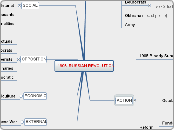1905 RUSSIAN REVOLUTION
POLITICAL
Autocracy
Tsar Family
Nicholas II
Alexandra
Alexi
Haemophelia
Nobles
Russian Orthodox Church
Beurocrats
Messengers
Tax Collectors
Okhrana (secret police)
Army
SOCIAL
Upper Class
Commerical Working Class
Proletariat
Peasants
Nationalities
OPPOSITION
Intellectuals
Constitutional Democrats
Octoberists
Social Revolutionaries
Social Democratic
ACTION
1905 Bloody Sunday
March on tsar winter Palace
End to War
Parliament
better Living/Working Conditions
Led by Father Gapon
Violent response
Loss of faith with Tsar
riots, strikes, murder
Reform
October Manifesto
Duma/Parliament
Rigging
No real power
Freedom of Speech, Religion
Right to from parties
Fundamental Laws
1906 PM Stolypin's Reform
Suppression of Revolutionary
Agriculture
Peasant Ownership of land
Education
Industry
Subtopic
Russification
ECONOMIC
Agriculture
5% Land farmable
out of date methods of farming
Manufacturing output Low
EXTERNAL
Russo-Japanese War
Over Korean Ports
Poor supply Lines
Fleets Destroyed
